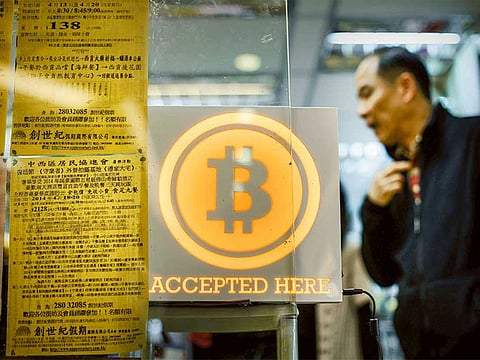Bitcoin soars, but winning central banks' backing will be no easy matter
Acceptance is only way to get these cryptocurrencies out of their parallel universe

Bitcoin, it seems, is subject to demand and supply laws.
One reason behind Bitcoin reaching its record high price is that there is a maximum number of this cryptocurrency that could be mined. This means that there is high demand, with the ceiling on its supply being reached soon. Interestingly also, this makes Bitcoin more of a commodity than a currency, except digitally.
What happens next depends on the perception of Bitcoin’s value by those buying into it. As long as they believe that the value holds water for future monetary transactions, then it would go up until demand for the digital commodity eases up to intersect with supply at a stable pricing point.
This value, nonetheless, may end up dropping if investors come to the conclusion that there is very little to do with Bitcoin in today’s monetary world, except to keep speculating in it… or to buy an electric car.
Mainly, holders of Bitcoins, including those who initially thought they could invest in it and then time their exit at the right price, will eventually realise these are only good to be used among themselves. Bitcoin specifically, and cryptocurrencies generally, have not been on the good side of central banks since their introduction.
Central banks, as guardians and facilitators of the world’s monetary system, have not shown clear inclinations that they will give cryptocurrencies the green light to be exchanged and used for transactions in our physical monetary world.
Undermine paper currency
The above may as well create a parallel monetary system that central banks do not approve of and may seek to undermine. Not because of its promise or lack thereof, but because such a monetary system is not under the purview of central banks, which by extension undermines the ability of central banks to control money supply and set inflation targets.
As a result, losing control over the value of their own currencies.
Each central bank that is keen on securing the position of its own currency in international trade and in debt markets will do what is within its capacity to regulate - and further regulate cryptocurrencies. That will decrease their appeal to their investors, and potentially, their users.
Alternatively, central banks may proceed with plans to create their own digital currencies or cryptocurrencies in a way that resembles their own fiat currencies. For instance, the People’s Bank of China (PBC) just introduced a digital yuan.
Its own trading universe
Until then, the prospects for cryptocurrencies would remain dim and confined within the consumer-to-consumer (C2C), business-to-business (B2B), and C2B transactions. This could, in the parallel monetary world mentioned earlier on, create a whole new set of exchange rates between one cryptocurrency and the other.
Consequently, individual transactions, as long as they are not hindered by central banks’ efforts at regulation, would take a similar route to that of fiat currencies, minus currencies’ clearing houses and central banks.
One way to think about this is to look at what existed before central banks and their fiat currencies, where one ounce of gold is equal to x ounces of silver and y ounces of copper etc., but digitally.
No easy acceptance
At the moment, cryptocurrencies are non-fiat currencies by the people and for the people. Whether they become an integral part of our existing monetary and trade system would be subject to their acceptance by central banks, if and only if they do not undermine the efforts by central banks to solidify positions of their own currencies.
Here, no central bank would want to be the first to relent a position that had been hard won over decades of trade transactions and debt issuance. If they ever do, it will have to a new reality accepted and adhered to by all major central banks.
The last thought that I want to leave you with: How would cryptocurrencies affect notions of money supply and inflation if incorporated into today’s monetary system?

- Abdulnasser Alshaali is a UAE based economist.







